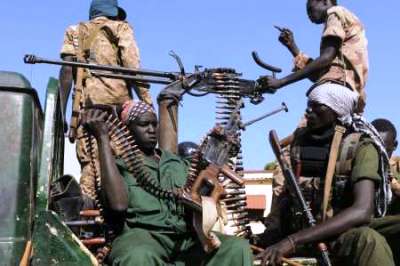S. Sudan could lose up to $28bn due to conflict
January 10, 2015 (JUBA) – South Sudan is likely to lose between US$22.3 and $28 billion if its current conflict continues for another one to five years, a London-based group said in a report.

According the 28-page report, the human costs of conflict, death, hunger and disease have significant longer term economic impacts. For example, it says $6bn could be lost due to the effects of hunger on labour productivity if the war rages on for five years.
South Sudan is in chaos due to political disputes within its ruling party. Thousands have died and about 1.8 million displaced since violence broke out in December 2013.
An estimated between $122 and 158 billion, the report says, could be lost, if the effects of the conflict were measured over a 20-year period.
DEFENCE EXPENDITURE
According to newly issued report, South Sudan’s spending on security could reach $2.2 billion, if the conflict lasted another five years.
“The savings in military spending that would result from resolving the conflict within a year from now would allow South Sudan to meet the internationally recommended target of allocating 20% of spending to education,” partly reads the 28-page report.
“The economic costs of the conflict to date are substantial, with a projected drop of 15% in South Sudan’s GDP for 2014,” it adds.
The conflict, characterised by brutal killings, rape, forced recruitment of children, mass displacement and the destruction of livelihoods, has shown no sign of an end despite regional leaders’ peace efforts.
Various reports from local and international human rights bodies implicate both warring parties in the South Sudanese conflict of committing crimes against civilians during the over one year conflict.
The report reportedly looked at the economic aspects of the conflict, ignoring break-down of social cohesion, sexual violence, child exploitation or environmental degradation, which are difficult to capture in their entirety in an economic cost benefit analysis.
REGIONAL IMPLICATIONS
Meanwhile, the report projects that the costs of conflict to South Sudan, its neighbours and the international community are likely to increase at an accelerating rate, the longer the conflict persists.
Ethiopia, Kenya, Sudan, Tanzania, and Uganda could between them reportedly save up to $53 billion if the South Sudan conflict were resolved within one year.
“Countries in the region, most notably Uganda and Kenya, may incur substantial financial costs relating to security needs. Figures reported for Uganda suggest that defence expenditure incurred as a result of the conflict is around double the government’s projected capital investment budget for the health sector for the coming financial year, and close to the capital investment budget for education,” says the report.
“If the conflict ended within one year rather than 5, the international community could save an estimated $29 billion by reducing expenditure on peacekeeping and humanitarian assistance,” it adds.
But to prevent the risk of South Sudan becoming a failed state, the report advocates for increased pressure on the parties to the conflict to end the fighting by implementing targeted individual sanctions, that include an arms embargo on to the young nation.
“If there is a return to large scale hostilities in 2015 as many predict, IGAD [Intergovernmental Authority on Development] and the AU [African Union] Peace and Security Council should implement targeted, individual sanctions that include an arms embargo,” it says.
The United Nations Security Council, it further advocated, should adopt a complementary international targeted sanctions regime that includes an arms embargo.
“However, if IGAD and the AU fail to adopt and implement these measures, the UN Security Council should lead and adopt such a sanctions regime,” the report recommends.
It also presses the African Union Peace and Security Council to publicly release findings of its inquiry on South Sudan immediately and use those findings as the basis for imposing targeted individual sanctions such as asset freezes and travel bans.
(ST)
